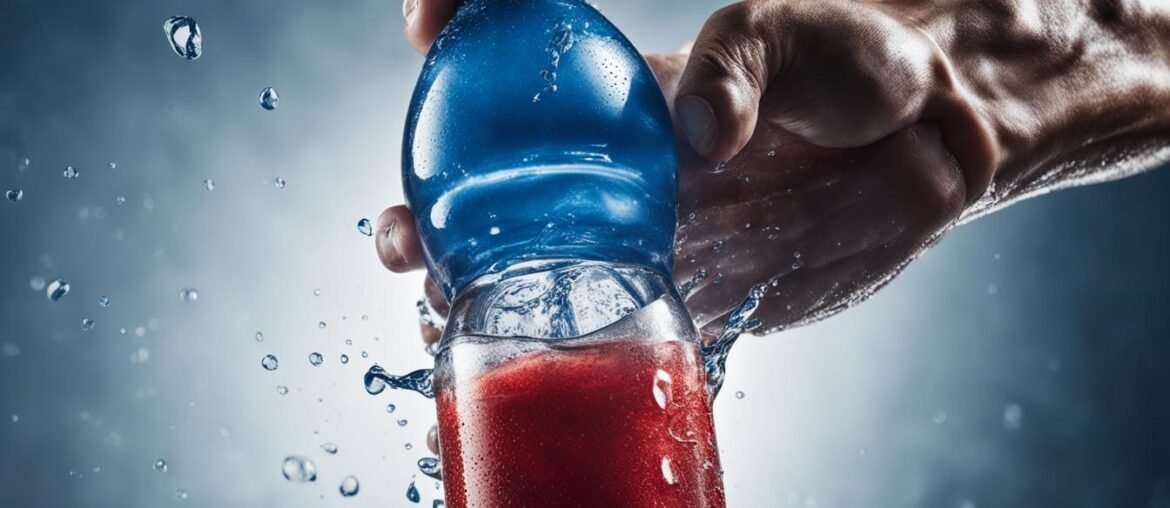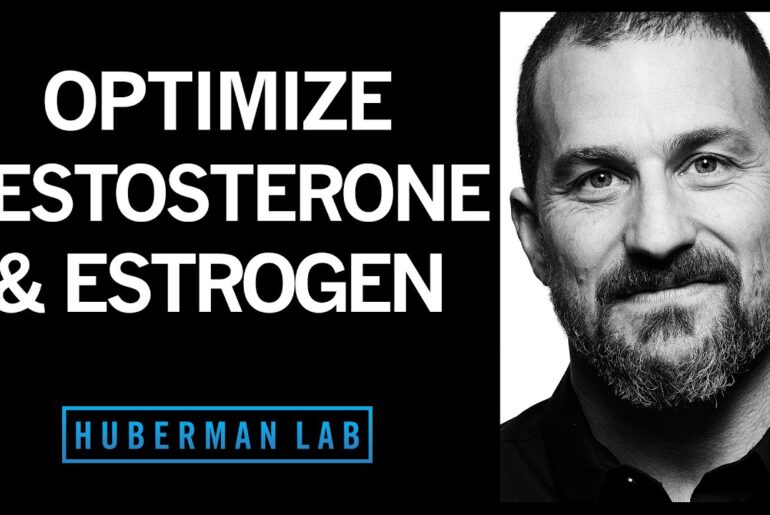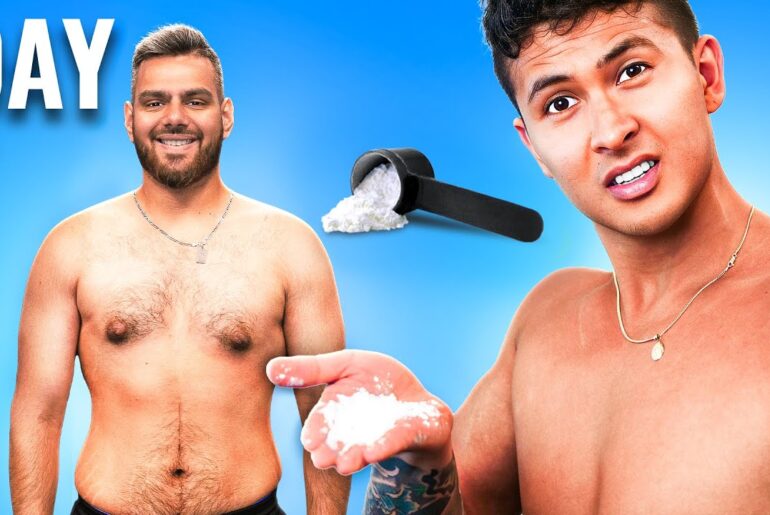It might come as a surprise to some that over 75% of Americans are in a chronic state of dehydration according to several studies. Now, consider the fact that hydration is a critical component in the effectiveness of widely-used supplements like creatine. As an individual deeply invested in my fitness journey and after extensively researching the subject, I’ve discovered that many fellow creatine users are navigating their hydration needs through guesswork. Through my exploration, I have crafted a hydration guide for creatine users to ensure maximum effectiveness and prevention of any potential adverse effects such as dehydration or water retention.
Understanding creatine hydration strategies isn’t just about drinking more water. It involves recognizing how much to consume, when to consume it, and under what conditions. My experience has taught me the importance of staying hydrated while taking creatine and I’m eager to share these insights to help streamline your supplementation process.
Key Takeaways
- Chronic dehydration affects a vast majority of Americans, impacting overall health and supplmentation outcomes.
- Effective creatine use goes hand-in-hand with adequate hydration, requiring more than just an increase in water intake.
- Engaging in informed hydration practices is fundamental to maximizing the benefits of creatine supplementation.
- Customized hydration strategies must consider individual body composition, activity levels, and creatine dosages.
- Diligent monitoring and understanding of personal hydration cues can enhance both exercise performance and health.
Understanding the Importance of Hydration for Creatine Users
As a fitness enthusiast, I’ve delved deep into the principles of muscle development and supplement use, especially when it comes to creatine. One of the non-negotiable aspects that I’ve discovered in my fitness journey is the pivotal role hydration plays in maximizing the benefits of creatine supplementation. The relationship between these two facets of exercise science underscores the importance of hydration for creatine users.
The Role of Water in Creatine Absorption
Through my exploration, I’ve learned that water isn’t just a mere ingredient for survival — it’s a crucial component for those supplementing with creatine. The molecular structure of creatine is such that it requires ample water to be dissolved properly, which in turn, ensures its effective absorption into the muscular system. It’s fascinating to observe that without optimum hydration, creatine cannot be efficiently utilized by the body, leading to less than ideal outcomes in muscle growth and performance.
Preventing Dehydration and Creatine Inefficiency
Emphasizing the prevention of dehydration is not just about avoiding dry mouth or dizziness; it’s about painting a complete picture where creatine achieves its intended results. Dehydration can sabotage the efficacy of creatine, hindering muscular gains and gym performance. I always share tips for maximizing hydration with creatine with my peers, as it lays the foundation for muscle development while preventing the unpleasant side effects of dehydration that could derail a well-structured training program.
| Benefits of Hydration | Effects of Dehydration |
|---|---|
| Enhanced creatine absorption | Limited muscle growth |
| Improved muscle performance | Reduced gym performance |
| Prevention of cramping | Potential for cramps and strains |
| Optimal supplement efficacy | Inefficient use of creatine |
Whether it’s through my interactions at the gym or my writings on fitness, I insist upon the integral nature of hydration for anyone using creatine. It’s not just about drinking water; it’s about strategically consuming it to amplify the power of this popular supplement. If we can master the tandem of creatine and hydration, we unlock new potentials in our physical capabilities and wellness journey.
Calculating Optimum Water Intake with Creatine
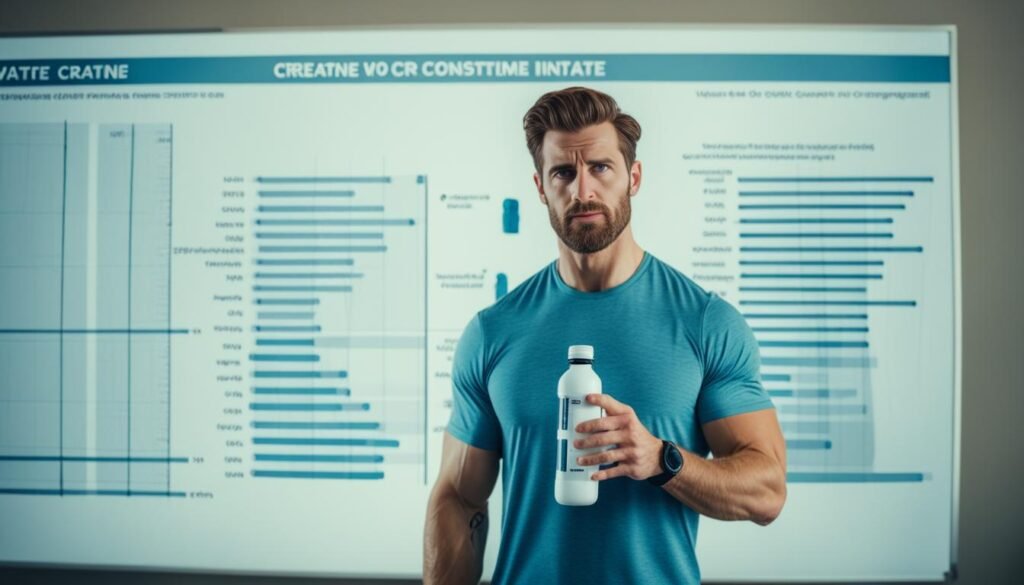
My journey with creatine supplementation has underscored the significance of hydrating properly with creatine. Through trial and error, and a fair amount of nutritional research, I’ve gleaned key insights on the best practices for staying hydrated on creatine. It’s not merely about drinking water; it’s about creating effective hydration strategies tailored to your body’s needs and the demands of your workout regimen.
Hydration Based on Creatine Dosage
As a rule of thumb, each dose of creatine, typically 3 to 5 grams, should ideally be chased with at least 8 ounces of water. This ensures proper dissolution and absorption. During the loading phase, where dosages are elevated, I found that increased water intake was essential to stave off cramping and ensure my muscles received the full benefit of the supplement.
The Balance Between Hydration and Creatine Effectiveness
Striking the perfect balance between hydration and creatine effectiveness is like walking a tightrope. I had to adjust my total daily water intake to not just accommodate my creatine usage, but also the hydration needs of my entire body. Based on everything I’ve experienced and read, aiming for 3 to 4 liters of water a day aligns with my endurance training and creatine goals.
| Creatine Dosage (grams) | Recommended Water Intake (ounces) | Total Daily Water Intake (liters) |
|---|---|---|
| 3-5 (Maintenance) | 8 per dose | At least 3-4 |
| 20-25 (Loading Phase) | 8 per dose | Increased based on body’s response |
Determining Your Personal Hydration Needs
As I navigate my fitness journey, I’ve learned that understanding my individual hydration needs is pivotal, especially when I incorporate supplements such as creatine into my regimen. Given the varied demands of each body, hydration tips for creatine users cannot be standardized, thereby drawing attention to the importance of personalized hydration strategies. To establish a baseline for hydration, I start by consuming an amount of water that corresponds to half of my body weight in ounces. Recognizing that this is merely a departure point, I then fine-tune my water intake based on the day’s activity level and the specifics of my creatine use.
- Identify base hydration level based on body weight in pounds
- Adjust water intake to reflect creatine usage during supplementation
- Increase fluid consumption to compensate for workout-induced losses
It’s crucial to stay vigilant about the body’s cues, such as thirst and energy levels, to ensure hydration is optimized for both the efficacy of creatine and the holistic health of the body.
| Body Weight (lbs) | Base Water Intake (oz) | Creatine Adjustment (+oz) | Exercise Adjustment (+oz) | Total Daily Intake (oz) |
|---|---|---|---|---|
| 150 | 75 | 5-10 | 15-20 | 95-105 |
| 200 | 100 | 10-15 | 20-30 | 130-145 |
| 250 | 125 | 15-20 | 25-35 | 165-180 |
It’s clear that a tailored approach to hydration, particularly when using supplements like creatine, is non-negotiable for both performance and health. Thus, it’s incumbent upon each individual to carefully monitor and adjust their water intake in accordance with innate needs and the added variables of exercise and creatine consumption.
Strategies for Staying Hydrated While Taking Creatine
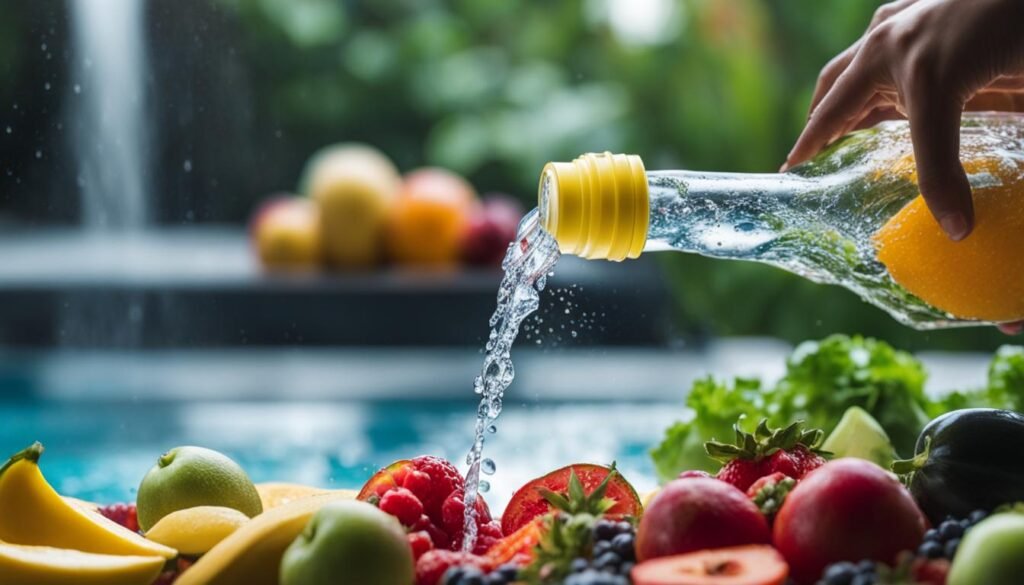
For those utilizing creatine to enhance fitness outcomes, executing a hydration guide for creatine users is crucial to maximize the supplement’s benefits and ensure bodily functions are supported. Understanding the intersection between hydrating effectively while using creatine and achieving your fitness goals is key. Through careful creatine and hydration planning, one can maintain optimal hydration levels. Let’s delve into specific strategies that support this endeavor.
Hydrating Before, During, and After Workouts
Managing hydration levels encompasses a dedicated focus on proper fluid intake throughout your workout routine. It’s important to begin your exercise session well-hydrated to lay the groundwork for an effective regimen. During physical activity, I recommend consuming small amounts of water regularly to replace fluids lost through sweating and to facilitate creatine uptake. Post-workout rehydration is equally important for recovery, aiding in the replenishment of water that has been utilized by the muscles and lost through perspiration.
Incorporating Electrolytes for Enhanced Hydration
The integration of electrolytes into your hydration plan can significantly bolster the process of water retention and balance. Electrolytes, such as sodium, potassium, and magnesium, are pivotal when it comes to maintaining fluid equilibrium in and out of cells—a process that creatine can influence. Ensuring that the body’s electrolyte levels are stable can enhance hydration efficacy and contribute to optimal creatine performance.
| Workout Phase | Hydration Tip | Electrolytes Role |
|---|---|---|
| Pre-Workout | Drink 16-20 ounces of water 2-3 hours before exercise | Prepare muscle cells for creatine and water uptake |
| During Workout | Sip on water every 15-20 minutes | Maintain electrolyte balance to support muscle function |
| Post-Workout | Consume 20-24 ounces of water for every pound lost | Restore electrolytes and fluid levels for recovery |
Hydration Myths and Facts for Creatine Users
In the realm of fitness and supplementation, creatine remains a subject of various myths, especially concerning hydration and water retention. Today, we’re setting the record straight, debunking creatine hydration myths and providing a water retention clarification tied to creatine use. Understanding the intricacies of creatine and its effect on the body is key to optimizing its benefits and dismissing unwarranted concerns.
Addressing the Myth of Creatine-Related Water Retention
Contrary to the persistent myth, creatine does not cause permanent or harmful water retention. Yes, it facilitates water uptake within muscle cells, a process which supports muscle growth and should not be mistaken for the superficial bloat often associated with fluid imbalance. In fact, this intracellular water retention is precisely where creatine’s power lies, as it aids in muscle recovery and performance. It’s crucial for users to understand the distinction to mitigate any unfounded fears.
The Truth About Creatine, Hydration, and Kidney Health
I want to provide insights on creatine and dehydration risks and how they correlate with kidney health. Science has largely refuted the myth that creatine supplementation is a direct cause of dehydration and kidney damage when taken responsibly. Adequate water intake is fundamental, not just as a countermeasure to potential water retention, but also as a protective buffer for the kidneys. By maintaining appropriate hydration levels, creatine users are unlikely to strain their renal system.
Let’s look at a table that contrasts the common myths versus the facts about creatine and hydration:
| Myth | Fact |
|---|---|
| Creatine causes harmful water retention. | Creatine retains water intramuscularly, aiding performance without causing general bloat. |
| Creatine use leads to dehydration. | With proper hydration, creatine use does not inherently lead to dehydration. |
| Creatine negatively affects kidney health. | Creatine is safe for kidneys when used as directed and with sufficient water intake. |
It’s important to continually educate ourselves on the ways supplements like creatine interact with our bodies. By doing so, we can embrace their benefits, make informed decisions, and put to rest any misconceptions surrounding their use.
The Connection Between Creatine Use and Muscle Hydration
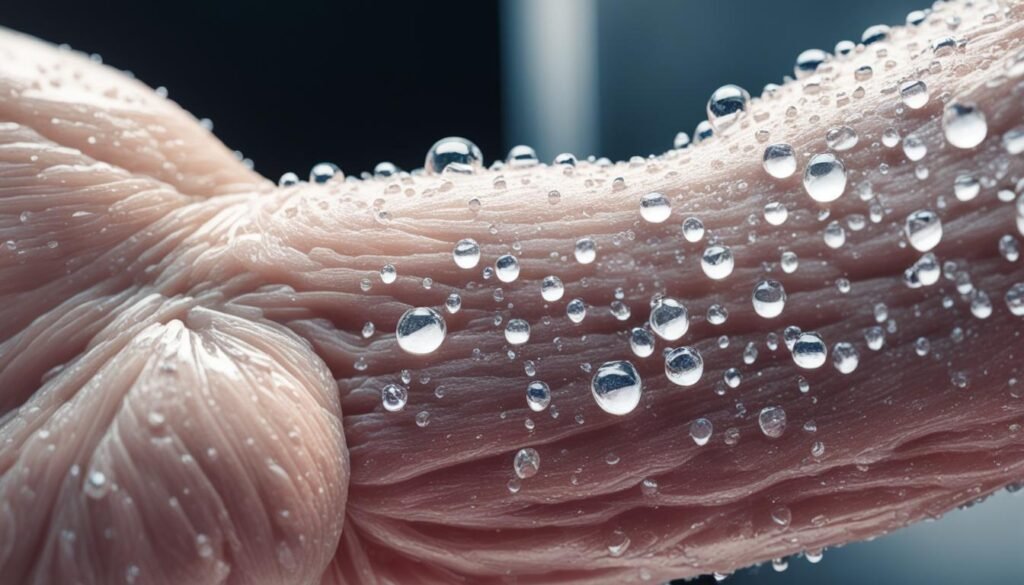
When we delve into the realm of fitness supplements, understanding the intricate relationship between muscle hydration, creatine and water uptake, as well as the benefits of hydration for creatine efficacy, is imperative. My exploration into these connections reveals that water is not a mere bystander; it is a critical player in the effectiveness of creatine supplementation.
At the cellular level, creatine functions as an osmolyte, meaning it influences the movement of water into muscle cells, promoting a well-hydrated state that is conducive to muscle growth and energy synthesis. This biological synergy is fascinating, as it accentuates the significance of water intake while supplementing with creatine. Without sufficient hydration, the promise of increased strength and muscle mass may not be fully realized.
If we consider our muscles as engines, then hydration is the oil that keeps everything running smoothly. Muscle hydration is essential for energy production and efficient muscle contraction, making water an indispensable ally of creatine.
Let’s break down what happens when you integrate ample hydration with your creatine regimen through an informative table:
| Muscle Function | Impact of Creatine | Role of Hydration |
|---|---|---|
| Energy Production | Enhances ATP regeneration | Facilitates nutrient transport and metabolic reactions |
| Muscle Strength and Volume | Promotes water retention in muscles | Ensures water is available for creatine’s volumizing effect |
| Recovery Process | Speeds up recovery by reducing muscle damage | Assists in waste removal and reduces muscle cramps |
I’ve found that educating ourselves on the fundamentals of muscle hydration opens up a new dimension to maximizing the effectiveness of creatine supplements. This knowledge mandates that anyone looking to benefit from creatine must prioritize their water intake to facilitate optimal water uptake into their muscles.
Remember, the synergy between hydration and creatine is not just about enhancing performance; it’s about embracing a comprehensive approach to health and body optimization. Drinking ample water while taking creatine is a simple yet profound step towards achieving your fitness goals.
To conclude, muscle hydration acts as the foundation upon which creatine can exert its full potential. This connection underlines a mutual enhancement — water improves creatine’s absorption and function, while creatine invites more water into muscle cells, thus further promoting hydration from within. With this symbiotic relationship in mind, I continue to advocate for the highest standards of hydration as a cornerstone of successful creatine supplementation.
Hydration Tips for Creatine Users

As I delve into the significance of hydration for those incorporating creatine into their fitness regime, it is imperative to adhere to daily water intake guidelines and employ techniques for tracking hydration to amplify the benefits of this powerful supplement.
How Much to Drink: Guidelines for Daily Water Intake
The cornerstone of effective creatine supplementation is maintaining a sufficient level of hydration. Experience dictates starting with the standard recommendation of 8 glasses of water per day. However, when factoring in creatine usage, an increase to this baseline is often necessary. Alongside water, consider hydrating beverages that contain electrolytes to replenish any minerals lost during intense workouts.
| Activity Level | Additional Daily Water (oz) | Comments |
|---|---|---|
| Moderate Exercise | + 12 to 16 | Adjust if sweat rate is high |
| High-Intensity Training | + 20 to 24 | Incorporate electrolytes |
| Sedentary Lifestyle | + 0 to 8 | Plain water is typically sufficient |
| Creatine Loading Phase | + 24 to 32 | Higher hydration need |
Track Your Intake: Tips for Monitoring Hydration Levels
A proactive approach to hydration tips for creatine users involves tracking daily water consumption. Smart water bottles with intake monitoring capabilities are valuable allies for this endeavor. Further, vigilant observation of urine color is a telltale hydration indicator. Aim for a pale straw hue, a sure sign that your fluid levels are on point. Additionally, never underestimate the body’s innate thirst signals and maintain cognitive alertness as markers of proper hydration.
Remember, it’s not just about reaching a quota—it’s about consistent, mindful hydration to complement your creatine journey. By doing so, you’ll support your muscles, enhance your workouts, and aid overall wellness.
Recognizing the Signs of Adequate Hydration

While maintaining hydration with creatine is essential, knowing how to recognize hydration levels becomes crucial in managing your supplementation regimen. Indicators of adequate hydration not only impact your workout performance but are vital for your overall well-being. Let’s delve into the reliable signs that suggest your hydration is on point.
Monitoring Urine Color for Hydration Levels
One of the most straightforward methods I use to check my hydration status is observing the color of my urine. A light yellow color typically points to proper hydration, which is especially pertinent when augmenting with creatine. To give you a better idea of what to look for, imagine the hue of pale straw. Veering towards clear is also acceptable, but any darker, and it’s a sign to increase fluid intake.
Understanding the Physical Symptoms of Proper Hydration
Aside from the visual urine check, I pay attention to bodily cues. A well-hydrated body will generally not experience symptoms like persistent headaches, undue fatigue, or a dry mouth—these are red flags signaling a need for more fluids. Recognizing these indicators of adequate hydration allows me to make timely adjustments and stay ahead in my health and fitness journey.
| Signs of Adequate Hydration | Signs of Dehydration |
|---|---|
| Light yellow urine | Dark yellow or amber urine |
| No incidence of dry mouth | Persistent dry or sticky mouth |
| Regular urination frequency | Decrease in urination |
| No headaches | Frequent headaches |
| Physical and mental clarity | Fatigue or dizziness |
Conclusion
Mastering the delicate dance of hydration when leveraging the muscle-boosting benefits of creatine is a journey I’m passionate about guiding you through. As we’ve navigated the nuances of hydration strategies and debunked myths, it’s clear that the path to peak physical performance is as much about the water we drink as it is about the strength we build. My mission has been to equip you with the knowledge that fine-tunes your water intake, unlocking the full prowess of creatine while dutifully protecting your health.
Recapitulating the Best Practices for Hydration and Creatine Use
By personalizing hydration strategies that marry my body weight with the precise dosage of creatine, I am able to effectively optimize its benefits. Recognizing that monitoring my body’s hydration signals is crucial, I’ve learned to listen to my physiological prompts and schedule my water consumption meticulously. It’s through this regimented approach that I ensure my body is adequately prepared to both receive and utilize creatine to bolster muscle growth and exercise performance.
Encouraging a Balanced Approach to Creatine Supplementation and Hydration
In closing, my final tips for creatine and hydration circle back to the heart of the matter: balance. The synergy between staying hydrated and supplementing with creatine demands a vigilant yet flexible methodology. It’s by fostering this equilibrium that I am able to champion my sport and health aspirations, allowing hydration to flow seamlessly through my routine, supporting my drive, ambitions, and the rigorous demands of my training regimen.
FAQ
What is the role of water in creatine absorption?
Water plays a critical role in the absorption of creatine by ensuring the supplement dissolves properly, which is necessary for effective absorption and use by the body. Adequate hydration also assists creatine in drawing water into the muscle tissue, which is beneficial for muscle development and performance.
How can I prevent dehydration and creatine inefficiency?
To prevent dehydration and maintain the efficacy of creatine, it’s important to consume enough water throughout the day, especially before, during, and after workouts. Monitoring your hydration status through urine color and physical signs of dehydration can help you make necessary adjustments to your water intake.
How much water should I drink when taking creatine?
Although water needs can vary, a general recommendation is to drink at least 8 ounces of water with every dose of creatine and aim for a total water intake of 3 to 4 liters, or 12 to 16 cups daily. This should be adjusted based on individual factors like exercise level, climate, and body size.
How do I balance hydration with creatine effectiveness?
Balancing hydration with creatine effectiveness involves a tailored approach, taking into account the creatine dosage and your personal hydration needs. Ensuring consistent water intake proportionate to your creatine consumption and physical activity level is key to maximizing the supplement’s impact while staying hydrated.
What are the best strategies for staying hydrated while taking creatine?
Effective hydration strategies include consistently drinking water throughout the day, emphasizing hydration before, during, and after workouts, and including electrolytes in your diet to promote fluid balance. It is also beneficial to evenly distribute your water consumption in relation to creatine intake and exercise.
Is it true that creatine causes water retention and bloating?
Creatine does cause water to be drawn into the muscles, which can lead to a temporary increase in weight. However, this is part of the muscle-building process and should not be confused with harmful bloating or excessive water retention. Proper hydration can help manage this effect.
Can creatine negatively affect kidney health and cause dehydration?
Concerns about creatine negatively affecting kidney health and causing dehydration are generally unfounded when it is taken responsibly and with adequate hydration. People with pre-existing kidney issues should consult with a healthcare provider before taking creatine.
Why is muscle hydration important for creatine users?
Muscle hydration is important for creatine users because the increased water content in muscles helps to facilitate energy production and muscle performance. Creatine promotes water uptake into muscle cells, contributing to increased strength and size, making hydration an essential part of creatine supplementation.
What are the guidelines for daily water intake for creatine users?
Daily water intake for creatine users should start with the general recommendation of 8 glasses per day, with additional adjustments for creatine dosage, exercise intensity, and individual needs. Adequate hydration should also account for the increased water demand of muscles saturated with creatine.
How can I track my hydration levels effectively?
To effectively track hydration levels, monitor the color of your urine, aiming for a pale straw hue. Keep tabs on your daily water intake, and stay attentive to hydration cues such as thirst, cognitive clarity, and physical symptoms of dehydration like headaches and fatigue. These measures help ensure proper hydration while using creatine.
What physical symptoms indicate that I am properly hydrated?
Proper hydration is generally indicated by a lack of symptoms such as persistent thirst, dark yellow urine, headaches, fatigue, dry mouth, and confusion. Feeling well-hydrated usually accompanies clear or light yellow urine, mental alertness, and physical vitality.

